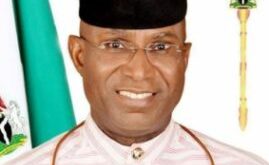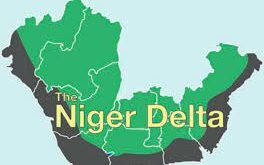By Young Erhiurhoro
Witchcraft is a common English parlance amongst Africans and some parts of the Asian continent. It’s very common to Africans because its usage is primarily synonymous with evil and mysterious activities. That is, power to kill, power to destroy, power to cause harm and power to do virtually everything that is associated with evil. This is the African description of witchcraft.
The practitioners of this ‘African Science’ are referred to as witches (females) and wizards (males).
In the African mentality, witches and wizards are evil people, people that possess the spiritual powers to fly in the night and converge in a meeting place usually called ‘coven’. The coven could be located on top of trees, on top of houses, inside plantain plantations, or on a three-legged path way.
Across the entire Niger Delta region, there is no community that is free from having a buck of these witches and wizards. During the colonial times and after the colonial period especially in the 60s, 70s and the 80s, there were stories of how witches and wizards were forced to confess and later set ablaze in communities in Yoruba and Igbo lands. There were some that consciously confessed on their own as a result of infestation of strange diseases or sicknesses, such ones were either stoned to death or hacked to death. And immediately after their death, such people whether men or women, were not fit to be accorded normal burial rites. They were buried in a special forest tagged as ‘evil forest’.
The evil forest according to late Professor M. Y. Nabofa, a renowned professor of Religious Studies, in his book titled, ‘Adam, The Evangelist,’ is a community burial ground in a forest for people that died ‘bad deaths,’ like those that confessed to witchcraft spirit, women that died with pregnancies, people that died as a result of strange sicknesses etc. Apart from this, in some communities in the Niger Delta region, witches and wizards were ostracized and banished for life. Some in this group usually ran to distant lands to seek refuge and freedom.
As I said earlier, in the 60s and 70s, witches and wizards made glaring confessions for being responsible for many havoc and mysterious things in a family or community as a whole. There were stories in different communities in Urhobo and Isoko ethnic groups in Delta State of how witches and wizards sucked the blood of their victims, set accident traps on motorable roads for a rich family member, caused infertility and barrenness for women especially marriage mates, caused poverty and hardship for people in a particular family, caused inter and intra communal crises and many uncountable evil activities.
In many occasions, witches and wizards were believed to metamorphose. That is, they could change from the human form to animal or other living thing to carry out their evil activities, which usually took place at night. They are believed to metamorphose in two ways: first, the soul of the witch could take the body of an already existing lower animal like bat, hawk or even mosquitoes to attack his victims. Secondly, the body of the witch can sometimes be changed into that of an animal which is strictly lycanthropy. Witches and wizards were also said to change to grass-cutters to destroy the cassava and yam farms of neighbours. Some could change to bush cows to attack hunters in the bush. In fact, the evil stories of witches and wizards are uncountable.
However, at this same period when the evil activities of these witches and wizards were becoming worrisome and pronounced in the different communities across the Niger Delta region, so many traditional religious bodies and herbalist homes that claimed to have higher and stronger power to subdue the power and spirit of witchcraft also emerged. They claimed to work against the practice of witchcraft in the land and how to expose their evil machinations by way of identification and confession.
In other words, these traditional religious homes gave assurance and hope to victims of witches and wizards and to those they had already planned to harm; that they have the potency and efficacy over every witch or wizard in the land. Since there was no physical sign on any part of the body to identify witches and wizards, the religious homes also promised the people of having the power to identify who was a witch or not.
One of such traditional religions that emerged in the land before the coming of Christianity to many communities in Urhobo, Isoko and Ijaw ethnic groups was the Igbe traditional religion.
The Igbe traditional religion as I have written in time past is a monotheistic religion which believes in Orise, the one and the Almighty God. It was founded in the early part of the 18th century by Prophet Ubiesha Etarakpo of Kokori Inland in present day Ethiope East Local Government Area of Delta State.
In the 70s and 80s, the Igbe religion spread like wildfire in the harmattan season across every nook and cranny of the Niger Delta region. This was because its first adherents came to discover that the holy chalk which was created from the clay soil, and used as their symbol of worship had the power and potency over the evil operations of witches and wizards in both the family and the community.
With this powerful gospel in the lips of members of the Igbe religion, so many people who were allegedly believed to be victims of the evil activities of witches and wizards started trooping in for quick salvation and protection against foreign and spiritual evil attacks within and outside their families. This was how the branches of the Igbe religion were established in different communities across the Niger Delta region.
More importantly, one of such prominent and independent Igbe religious homes of that time was the Igbe Orhe Ofuafo Oghene Healing Home Inc. This Igbe religious home was established by the late Uku Sunday Efedudu, an Unenurhie man from Evwreni kingdom in Ughelli North Local Government Area of Delta State. He established the Igbe religion in his home town of Unenurhie community.
Late Uku Sunday Efedudu was an ardent and dedicated disciple of Uku Igugu of Ugono-Orogun. He served as ‘Olori’ under Uku Igugu for many years until he was ordained ‘Uku’ in 1975 by Uku (Supreme) Ibodje Ubiesha of the supreme headquarters of the Igbe religion at Kokori Inland. The Uku is an equivalent of a bishop or a general overseer of a church.

This Igbe religious home was so prominent in the 70s and 80s in the then Bendel State. People were trooping from nearby communities in Urhobo and Isoko and from far away Ijaw communities of Patani, Bomadi, Burutu and also from Warri, Sapele, Benin City and interior villages of Itsekiri and Ndokwa land. The place was a beehive of religious activities every day. It was always booming like the modern Pentecostal churches of today in Nigeria because the Igbe religion, to the testimonies of many members, had the power and potency to do a lot of miraculous works, like healing all sorts of sicknesses, protection against the mysterious attacks of witches and wizards, provision of abundant blessings to its faithful members and many more good things of life. This therefore endeared the Igbe Orhe Ofuafo Oghene Healing Home Inc to many people in the Niger Delta region.
I was brought up and trained as a child in the palatial compound of this great man of God. I was initiated into the Igbe religion as a little child in 1985 in company of my mother, late Mrs. Comfort Atori nee Oserada from Uwheru kingdom. My mother joined the Igbe religion as a result of a strange epileptic sickness which attacked her immediately I was born. According to my mother, she was taken to so many hospitals, herbal homes and religious healing homes to no avail. There was no cure or appreciable improvement in her health status, rather her condition continued to deteriorate.
Her health situation continued to grow worse until a close family friend who was already a member of the religion encouraged my mother’s family to take her to the Igbe religious home at Unenurhie town. This was how my mother and I became members of the Igbe religion. And true to my testimony here, my mother was completely healed of the strange sickness through the licking of the holy chalk and the bathing of the holy water. And to crown it all, my mother remarried to an Unenurhie man, late Olori Harrison Atori who later became the general secretary of the Igbe religion till his death. This man was healed of a mental sickness in the Igbe religion. The marital union was blessed with a male child of fate named ‘Oriogharovwe,’ meaning, ‘I’m blessed by the holy chalk.’
As new members, I was taught the tenets and practices of the religion, even from childhood. As children, on every worship day, we would be gathered in the worship hall by an older and experienced member of the religion, Mr. Pius Afah, and would be taught the dos and the don’ts (commandments/laws) of the Igbe religion. In fact, even till these days, the Igbe compound is the biggest and largest in the entire Unenurhie community.
During the 70s and 80s, the compound was the busiest as people of all tribes who were members, seeking for a solution to one problem or the other, were resident in the compound. I grew up to meet Isoko people, Ijaw people, Itsekiri people, Kwale people and different Urhobo people living in Uku Sunday’s compound.
No doubt, this Igbe religious leader had so large a heart that he accommodated everybody and brought them together as brothers and sisters of one big family. As a first time visitor to the compound, you would think that the late Uku Sunday Efedudu was the traditional ruler of Unenurhie community because of his set of royal regalia and his colourful dressing all through his days on earth. Secondly, you won’t be able to identify the leader’s biological children and those of his members in the compound. He took all the children as his own children without any segregation or hatred. And we were placed under the mentorship of Mr. Pius Afah for proper upbringing.
I grew up to see how the holy chalk was used to identify witches and wizards. This was normally done when there were accusations or counter-accusations among members of a family or a community. Since the news had spread everywhere that the Igbe Orhe Ofuafo Oghene Healing Home Inc was capable of identifying witches and wizards and could kill a witch who refused to confess at the end, when such accusations comes up from members of a family or community, the elders in the community would mandate the people to go to the Igbe religion and carry out the mystical process of identification.
Immediately they arrive, the suspected witches or wizards would be first initiated formerly into the religion before they would proceed to the identification process called, ‘the breaking of the holy chalk.’ After the initiation, the suspects would line up in a single file before the religious leader. The suspects would each say his or her mind over the accusations against him or her while holding tightly unto the holy chalk. Thereafter, the leader would conclude the prayers on the holy chalk and ask the suspects to break it and lick.
After each person had licked his or her little piece of the holy chalk, they would be asked to go home and advised to live together in love, without laying accusing fingers on anybody again, with the understanding that the work of identification and confession was now left for the holy chalk to do.
In some instances, it could take a month, six months or a year for the holy chalk to do its mystical work of identification. To identify a witch or wizard in this scenario, the holy chalk could infest the real person with any kind of a strange sickness or at times, it could be the spirit of madness. Once this was observed in such a person, he or she would be monitored until he or she would start to confess about all the evil and mysterious things he or she had done to people with his or her witchcraft powers. As soon as this stage was established, the person in question would be brought to the Igbe compound where he or she would be formerly confirmed as a witch or wizard before the generality of all Igbe and community members present.
In those days, the British colonial government in Nigeria proscribed so many of such traditional religious homes that had the power and potency to identify witches and wizards in the Niger Delta region. They were branded as barbaric organisations. This was because immediately after the confession of the person, he would be stoned to death or drowned in a river. For instance, the Eni cult of Uzere in Isoko land was proscribed in 1905 by the colonial authorities because the Eni divinity had the power to drown a witch or wizard during the swimming trial to identify witches and wizards.
However, in the case of this Igbe Orhe Ofuafo Oghene Healing Home Inc and some other Igbe branches, it wasn’t so. After the witch or wizard consciously confessed, he or she would not be touched by anybody. There were times if he or she totally repented from doing evil with the witchcraft spirit, he could be saved by the holy chalk and ‘Orise,’ the Almighty God. And in some cases, he or she could become a prophet or prophetess (Odjobor) after a long time of service and dedication to the faith. But if he continued in doing evil with the same witchcraft spirit, the holy chalk has the potency to kill him or her.
This was the major reason why the Igbe religion wasn’t proscribed by the colonial government. The religion avoided inhuman treatment to confirmed witches and wizards unlike other traditional religious homes. The Igbe religion generally preaches salvation of the soul, repentance from sins and evil acts and forgiveness of one another on wrong doings.
From the numerous experiences I had as a member of the Igbe religion, I came to understand that witchcraft is truly a “spiritual science and a school of knowledge” as was defined by the teachings of L. Ron Hubbard of the Church of Scientology. It is not a black or evil power as so many people think. However, the disparity between the African witchcraft and the western (whiteman) witchcraft is in its true application and usage.
Africans misapplied theirs and it led to different kinds of evil activities. This is why the African witchcraft is called ‘black witch.’ Whereas white men applied their witchcraft knowledge in the right direction and it produced good results in terms of advanced technological feats in medicine, machines/automobiles, information technology, industrial revolution and many other good things of life, which all of us are coincidentally enjoying today.
Without doubt, those technological achievements the white men have recorded so far in human history were not just done only from academic or pedagogical knowledge. It was the combination of both the academic knowledge and the witchcraft knowledge, which is regarded as a “school of knowledge” in those high-tech countries like America, India, Britain, China etc, in the right proportions that brought about the everyday change and innovations in our modern world.
On this note, let Nigerian witches and wizards especially those from the Niger Delta region change their archaic and barbaric ways of practicing witchcraft to the modern and advanced ways like those of the advanced countries to make life more meaningful and comfortable for the Nigerian people.
Young Erhiurhoro; Kjc is a reporter and a member of the Urhobo Historical Society.
 PH Mundial – Port Harcourt Online Newspaper News Across The Region
PH Mundial – Port Harcourt Online Newspaper News Across The Region





